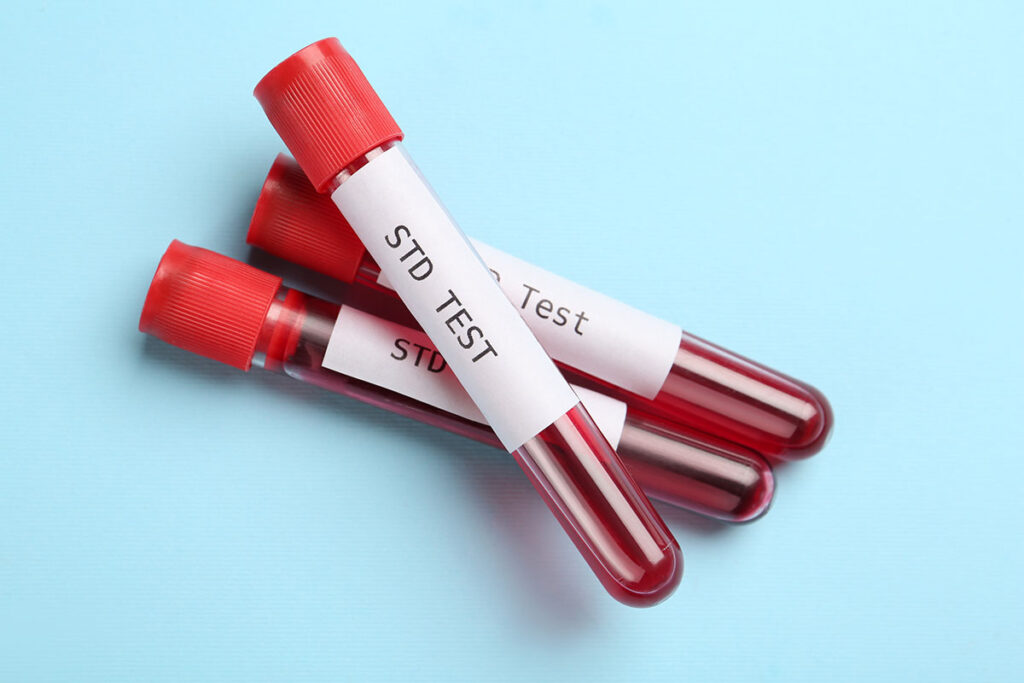The data around sexually transmitted diseases (STD) in the United States suggests they are on the rise with no signs of slowing. Around 2.5 million cases of chlamydia, gonorrhea, and syphilis were reported in 2021, according to CDC estimates.
STD awareness is something everyone should take seriously as an STD can have serious long term health effects.
Facts about STDs
- As many as 1 in 2 sexually active persons contract some type of STD by 25.
- Adolescents, young adults, and males with male partners are at higher risk of getting STDs.
- Although many STDs are preventable, there are more than 20 million new cases in the United States each year.
- The spread of STDs can be lowered through education, STD testing, vaccination, and the use of condoms.
Chlamydia
Over 1.5 million cases of Chlamydia were reported in 2021, making it the most common STD in the United States.
As with other STDs, chlamydia is transmitted through vaginal, anal, or oral sex. Although chlamydia affects both men and women, it can cause permanent damage to the female reproductive system in the long term. This can make it difficult or impossible to get pregnant later on.
Chlamydia is often symptomless, but when symptoms occur they include: abnormal pain, discoloured discharge or a burning sensation when passing urine.
Gonorrhea
Gonorrhea is an STD that can cause infection in the genitals, rectum, and throat. It is very common, particularly among young people ages 15-24. Like chlamydia, individuals who have been infected with gonorrhea usually show no signs or symptoms. If symptoms do appear they can include pain or burning during urination, an abnormal discharge from the penis, vagina, or anus and swelling in the testicles.
Trichomoniasis
Trichomoniasis is caused by the parasite trichomonas vaginalis. It is another STD that usually occurs without symptoms. Only 30% of people who are infected with trichomonas go on to develop symptoms. However, if symptoms are present, they typically present as yellow-green vaginal discharge and pain during sexual intercourse.
Hepatitis B
Hepatitis B is an infection of the liver caused by the hepatitis B virus (HBV). Symptoms usually appear 1 to 4 months after infection and include pale coloured stools, dark urine, abdominal pain, fever, weakness, nausea and vomiting. If you suspect that you have been exposed to Hepatitis B either through shared needle use or sex with a person infected with Hepatitis B, be sure to see a doctor.
Most people with Hepatitis B will get better after a few months but prompt treatment and vaccination is important.
HIV
HIV is a virus that attacks the body’s immune system. If HIV is not treated promptly it can lead to AIDS (Acquired Immunodeficiency Syndrome). Symptoms of HIV will vary, but many will have flu-like symptoms within 2 to 4 weeks after infection. As the infection progresses, other symptoms such as fatigue, night sweats, muscle aches and swollen lymph nodes may occur. Other individuals experience no symptoms at all. The only way to know if you have HIV is to get tested.
The CDC recommends that everyone ages 13 to 64 get tested for HIV at least once as part of routine health care.
The management of HIV has improved dramatically but quick diagnosis and treatment is essential. Speak to a health care provider if you notice these symptoms or have reason to believe that you may have been exposed to HIV.
Syphilis
Although syphilis is a less well-known STD it can cause major health problems if left untreated. It can be contracted through vaginal, anal, or oral sex. A syphilis infection can be symptomless, but often presents with a painless, round, and red sore— typically on the genitals, rectum, or mouth.
If you have reason to suspect that you may have contracted syphilis, be sure to get tested immediately.
When to get tested for an STD and why
- Your partner has been diagnosed with an STD
- You notice an abnormal discharge from the vagina or penis
- You experience burning, itching, or bumps near the genital area or inner thighs
- As part of a routine STD testing (e.g. yearly or every 6 months)
- If you have started a relationship with a new partner
- You’re sexually active and not in a mutually monogamous relationship
Remember, the absence of symptoms is not a reliable predictor of who may or may not have a STD. When in doubt, get tested!
Reduce the risk of getting an STD
The following steps can help you lower your risk of getting an STD
- Using condoms correctly every time you have sex
- Being in a mutually monogamous relationship with a partner
- Reducing your number of sex partners
Getting tested at A+ Family Urgent Care in Tampa
Urgent Cares provide quick, easy and professional services to assist with the testing, diagnosis and treatment of STDs. Other benefits of using an Urgent Care are:
- No appointment is required
- Patients can walk in, get tested, receive results, and get prescribed treatment all in the same location
- Privacy and confidentiality is assured
- Testing for all major STDs is provided
